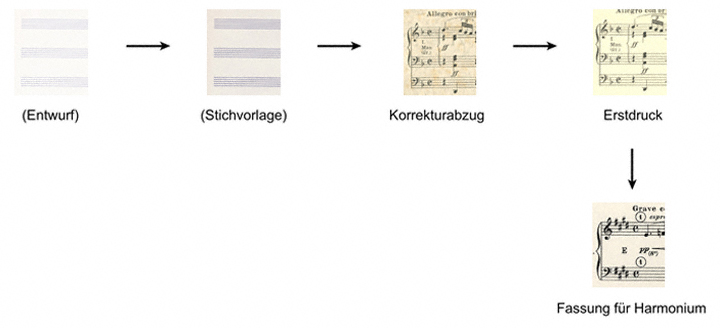II. Sonata in D minor op. 60
for organ
- I. Improvisation
- II. Invocation
- III. Introduction – Fuge
Herrn Professor Martin Krause in Dankbarkeit zugeeignet
- -
- -
- Invocation (from II. Sonata d minor op. 60), Version for reed organ
1.
| Reger-Werkausgabe | Bd. I/3: Phantasien und Fugen, Variationen, Sonaten, Suiten II, S. 2–32. |
| Herausgeber | Alexander Becker, Christopher Grafschmidt, Stefan König, Stefanie Steiner. |
| Verlag | Carus-Verlag, Stuttgart; Verlagsnummer: CV 52.803. |
| Erscheinungsdatum | Juni 2012. |
| Notensatz | Carus-Verlag, Stuttgart. |
| Copyright | 2012 by Carus-Verlag, Stuttgart and Max-Reger-Institut, Karlsruhe – CV 52.803. Vervielfältigungen jeglicher Art sind gesetzlich verboten. / Any unauthorized reproduction is prohibited by law. Alle Rechte vorbehalten. / All rights reserved. |
| ISMN | M-007-09754-7. |
| ISBN | 978-3-89948-170-9. |
1. Composition
1.1.
On the occasion of a gala concert by the Nördlinger Liederkreis on 5 August 1901, Reger was offered a new publishing contract. He wrote to Alexander Wilhelm Gottschalg, who had made the introduction: “You spoke in Nördlingen […] about the fact that Herr Leuckhard would like to have an organ work from me. Now; I’m willing to provide Herr Leuckhardt with one.” (Letter dated 17 August 1901) Here he was referring to the Leipzig publisher F.E.C. Leuckart, whose proprietor, Constantin Sander, had become aware of Reger. As a royalty Reger suggested “15 M [Marks] per printed page, a sum which will seem modest to you and probably Herr Leuckhardt in consideration of the fact that I will only supply good material” (ibid.). However, the move to Munich on 1 September kept Reger from regular composing for weeks; during this period he only wrote short pieces (supplements for periodicals and songs, see Kompositionsdaten), and even the new organ work requested by Sander still did not have any firm shape.
The previous year, following the publication of his 1st Sonata in F sharp minor op. 33, Reger had declared to the critic Georg Göhler that the chorale fantasia was “for the innermost aesthetic reasons more suitable to the nature of the organ than the form of the sonata”. (Letter dated 10 February 1900) Since October 1900, however, intensive study of the organ sonatas of Karl Wolfrum and Joseph Renner led to a renewed examination of the genre. Reger acknowledged Renner’s 1st Organ Sonata in G minor in particular as being “totally German in style […]; we can equally say ‘Bachian’; that is, born of the spirit of Bach”. (Letter dated 26 November 1900) According to a letter Reger wrote to Gottschalg, at the turn of the year 1900/1901, a new organ sonata was “more or less finished in my head”; (Letter dated 30 Dezember 1900) this was originally intended to have the opus number 57, but that number was then assigned to the Symphonic Fantasia and Fugue.
The beginning of composition of the 2nd Sonata in D minor op. 60 probably coincided with a flattering article by the future dedicatee, Martin Krause, in the periodical Musik-Woche,1 to whom Reger wanted to respond with a new work. At the beginning of December, when Reger thanked Krause for accepting the dedication, the form of the work was at least established: “when my organ sonata is finished, which it will be by about the 12th December, I will take the liberty of informing you about the completion of the work”. (Letter dated 2 Dezember 1901) The publisher Sander, who was already waiting for the manuscript “with impatience” (ibid.), had to be put off by Reger on 11 December: “The reason I haven’t yet sent you my organ sonata is because I keep polishing it, i.e. I am going through it over and over again.” (Letter) Only on 17 December 1901 was the composition completed, and Reger could tell the dedicatee: “The sonata is finished! Hurrah!” (Letter)
2. Publication
2.1.
Shortly after the completion on 17 December 1901 Reger must have sent the engraver’s copy to the publisher, for as early as 31 January 1902 he wrote to Henriette Schelle that he was expecting the first printed edition “in a few days” (Letter). Evidently a delay occurred, for only on 26 February was Reger able to send the music critic Theodor Kroyer a copy of the “2nd Sonata op 60 for organ which has just been published”. (Letter)
3.
Translation by Elizabeth Robinson.
1. Reception
At present, there are no records of performances in Reger's time.
1. Stemma

2. Quellenbewertung
Der Edition liegt als Leitquelle der Erstdruck zugrunde. Da die autographe Stichvorlage verloren ist, konnte als zusätzliche Quelle nur der Korrekturabzug herangezogen werden. Neben Phantasie und Fuge d-moll op. 135b ist dies bei den Orgelwerken der einzige Fall, in dem ein Korrekturabzug erhalten ist.
Der Erstdruck der Fassung des II. Satzes für Harmonium wurde aufgrund der abweichenden Idiomatik der Instrumente bei Fragen der Phrasierung und Agogik nicht berücksichtigt; der einzige vom Original abweichende Ton (in T. 24) dient vermutlich der grifftechnischen Vereinfachung, sodass auch dieser unberücksichtigt bleibt.
3. Sources
Object reference
Max Reger: II. Sonata in D minor op. 60, in: Reger-Werkausgabe, www.reger-werkausgabe.de/mri_work_00060.html, version 3.1.1, 31st January 2025.
Information
This is an object entry from the RWA encyclopaedia. Links and references to other objects within the encyclopaedia are currently not all active. These will be successively activated.